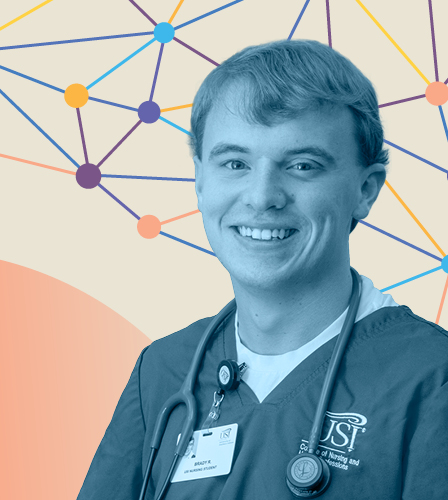A Call Leads to a Calling
by Erin Meyer
A Call Leads to a Calling
A late-night phone call in the Fall of 1999 changed Larry Back's life. The USI graduate and longtime employee had no idea it would eventually inspire him to change the lives of countless others.
That October evening, his wife picked up the receiver and heard panic in their daughter-in-law’s voice. Her husband, the Backs’ 23-year-old son, was out of control. Loud. Aggressive. Threatening to quit his job. “It turned out he was having a manic episode,” Back ’99 said.
They called 911, and as their son was admitted to a facility for the help he needed a receptionist told the Backs about an organization that might help them: the National Alliance on Mental Illness, or NAMI.
They enrolled in NAMI Evansville’s free Family-to-Family course a few months later. Over the next 12 weeks, alongside others with loved ones battling mental illness, they learned about diagnoses, the brain’s biology and, importantly, how to better communicate with their son, diagnosed with bipolar disorder. “You had to stop and think about what you were going to say, so you really needed to listen more carefully,” Back said. “It just made you be more reflective.”
When the course ended, the Backs agreed to stay involved as volunteers; Larry, especially, discovered a passion—and talent—for advocacy. Over the past 20 years, he’s lost track of the number of courses he’s taught and support groups he’s led for family members of, and individuals with, mental illness. As NAMI Evansville’s longtime affiliate leader, he now answers three or four calls a week from people across the country in need of resources or support. “You hear a lot of stories that are hard to hear,” he said. “I think back to when we needed the help, it was there. So, I feel like if I can help somebody else, or at least point them in the right direction, [I want to do that].”
Five years ago, one of those calls came from Kent Kunce, a landlord in Evansville desperate to help a tenant and friend with bipolar disorder. The situation was “reaching crisis phase” when he connected with Back.
“He listened very effectively,” Kunce recalled. Together, they talked through options, empowering Kunce to initiate a delicate—and potentially life-saving—discussion with his tenant. “I never would have been able to accomplish that without Larry. He truly was a godsend.”
The experience increased Kunce’s awareness of mental health struggles other tenants faced. Determined to be more confident and knowledgeable in the future, he enrolled in a NAMI Evansville course and began attending support group meetings led by Back.
Today, Kunce is not only better informed about mental illness, he’s also deeply invested—as the president of NAMI Evansville’s board of directors. “I would not have found all of these things if it had not been for me finding Larry,” he said. “He’s just a wealth of knowledge and a great resource for our community.”
In addition to facilitating NAMI Evansville events, which have continued virtually during the pandemic, Back trains volunteers across the state to become NAMI leaders in their communities. He also spends time visiting patients at the Evansville State Hospital, where he was named Volunteer of the Year in 2018.
A 27-year veteran of USI’s Information Technology Department dedicated to maintaining campus hardware and software as a Senior Applications Administrator, Back shares his technical expertise as well—by teaching computer skills classes at the Peace Zone in Evansville. The peer-run recovery center aids adults struggling with mental health and/or addiction issues. “He puts [our peers] first and puts them at ease,” said Michelle Krack, Certified Recovery Specialist at the Peace Zone. “We had several people that didn’t know the first thing about computers, and they said he really helped them navigate through that.”
Recently retired from USI, Back remains as involved as ever with NAMI Evansville, though he is always looking toward the future; new volunteers are critical to fulfilling the organization’s mission. He knows discussing mental illness and its effects—on those who suffer from it and their loved ones—isn’t easy. But it is important. He knows because he’s lived it. Because he is still living it.
“[In support group meetings] we’ll talk about, ‘Are we in crisis? Are we learning to cope? Or are we advocating?’ Oftentimes, he’ll say, ‘Right now, today, I’m advocating. But I’m one phone call away from being in crisis,’” said Kunce. “His experience … is so important to reassuring people that they’re not alone.”
It may be impossible to predict when the phone will ring with life-changing news. But when it does, at his home or any other, Larry Back is ready to answer.






